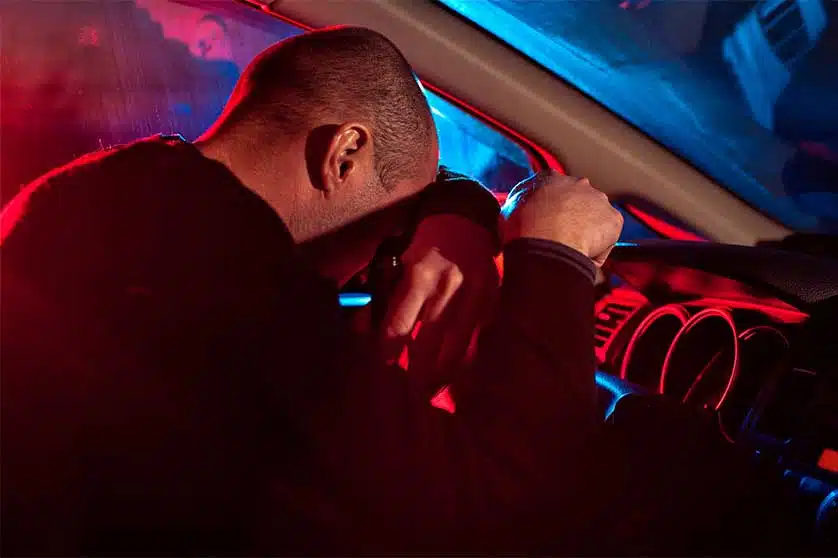Drunk Driving Facts & Statistics In Massachusetts

Like most states, Massachusetts bans residents from driving with a blood alcohol concentration (BAC) at or above 0.08. That’s because alcohol impairs your ability to drive.
Even so, many Massachusettsans break this law and face alcohol-related crashes, which are often deadly. To reduce these deaths, the state has implemented a variety of prevention strategies.
Drunk Driving Facts & Statistics In Massachusetts
According to the Centers for Disease Control and Prevention, 2.5% of Massachusetts residents reported driving after drinking too much in the past 30 days, compared to a national average of 1.7%.
Car Accidents
In 2019, 33% of Massachusetts residents involved in car accidents had a BAC of 0.08 or above, according to the National Highway Traffic Safety Administration (NHTSA). People with this BAC can’t drive safely due to impaired judgment, reason, vision, and coordination.
DUI Arrests
Under Massachusetts law, drivers with a BAC at or above 0.08 will face a DUI (driving under the influence) charge.
A conviction could lead to fines, license suspension, and even jail time. The state also has a zero tolerance law that makes it illegal for drivers under 21 to have any measurable amount of alcohol in their systems.
Massachusetts reported 9,426 DUI arrests in 2019, compared to 1,024,508 nationally. Of those arrests, 15 involved drivers under age 18, compared to 3,092 nationally.
Drunk Driving Death Rates
Between 2009 and 2018, 1,243 Massachusetts residents died in motor vehicle crashes involving drunk drivers.
By sex, the state’s drunk driving death rate was 0.9 for females and 2.6 for males, compared to a national average of 1.6 and 4.9 respectively.
By age, the drunk driving death rates were as follows:
- All ages: 1.7 (compared to 3.2 nationally)
- Ages 21 to 34: 3.5 (compared to 6.2 nationally)
- Ages 35 and up: 1.6 (compared to 3.1 nationally)
In 2019, the state saw 110 alcohol-impaired driving fatalities. Of those fatalities, 5 involved drivers under 21.
COVID-19 Spike
The state’s drunk driving death rate rose in the spring of 2020, which also marked the start of the COVID-19 pandemic.
During this time, 59 people died in drunk driving accidents, compared to 52 in spring 2019 and 50 in spring 2018. This increase is probably related to the fact that many people started abusing alcohol to cope with pandemic-related stress.
Drunk Driving Prevention
Massachusetts’ DUI laws have helped decrease the alcohol-impaired driving fatality rate. Other strategies the state uses to prevent drunk driving crashes include:
Ignition Interlock Devices
An ignition interlock device (IID) is a small breathalyzer installed in a person’s vehicle. To start the vehicle, the driver must blow into the IID. If the device shows that the driver’s BAC is above a certain level (typically 0.02), the vehicle will not start.
In Massachusetts, drivers with two or more DUI convictions must have IIDs in their vehicles.
Publicized Sobriety Checkpoints
A publicized sobriety checkpoint is a location where law enforcement officers check drivers for signs of impairment. Depending on the location, officers may check some or all of the drivers who approach the checkpoint.
To reach maximum effectiveness, publicized sobriety checkpoints should be highly publicized through mass media campaigns. When drivers know these checkpoints exist, they are much less likely to drink alcohol or use other drugs before getting behind the wheel.
High-Visibility Saturation Patrols
A high-visibility saturation patrol is a large patrol of law enforcement officers patrolling a certain area to detect impaired drivers. They typically occur in areas with high rates of drunk driving accidents.
Like publicized sobriety checkpoints, high-visibility saturation patrols are most effective when highly publicized.
School-Based Instructional Programs
Many Massachusetts schools host programs in which students learn about the dangers of driving drunk or getting in a car with a drunk driver. These programs can help children and teens make smart, life-saving decisions as they enter adulthood.
Alcohol Use Disorder Treatment
A lot of drunk driving fatalities involve drivers with alcohol use disorder. Alcohol use disorder (also called alcohol addiction) is a serious disease that makes you feel unable to stop drinking alcohol.
Massachusetts communities can decrease alcohol-related deaths by providing more alcohol addiction screenings. The screenings can identify people at risk for alcohol use disorder in schools, health care facilities, and other locations.
These individuals can then seek inpatient or outpatient treatment. The most common treatments for alcohol use disorder include medical detox, behavioral therapy, and medication-assisted treatment.
To learn more about treatment for alcohol use disorder, please reach out to Spring Hill Recovery Center. Located in peaceful woodlands, our board-certified healthcare providers offer personalized, residential care to help you or your loved one stay alcohol-free.
- Centers for Disease Control and Prevention — Sobering Facts: Alcohol-Impaired Driving https://www.cdc.gov/transportationsafety/pdf/impaired-driving-new/CDC-impaired-driving-fact-sheet-Massachusetts.pdf
- Commonwealth of Massachusetts — Ignition Interlock Device Program https://www.mass.gov/guides/ignition-interlock-device-program
- Foundation for Advancing Alcohol Responsibility — National Drunk Driving Statistics Map https://www.responsibility.org/alcohol-statistics/state-map/state/massachusetts/
- Massachusetts Office of Grants and Research Highway Safety Division — Annual Report FFY 2021 https://www.mass.gov/doc/ffy-2021-massachusetts-highway-safety-annual-report/download
- National Highway Traffic Safety Administration — FARS Encyclopedia: States - Alcohol https://www-fars.nhtsa.dot.gov/States/StatesAlcohol.aspx


